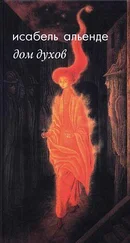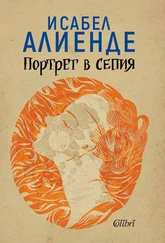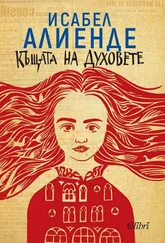They were often joined by their neighbors, Meche and Ramiro, who brought a basket of fresh vegetables from their kitchen garden and a couple of jars of homemade jam. Even though Ramiro was in good health, Roser insisted to Victor he was going to die at any moment, and in fact this is what happened. He was knocked down and killed by a drunken driver. When Victor asked his wife how on earth she had known, she told him she could see it in Ramiro’s eyes: he was marked by death. “When you become a widower, marry Meche, understand?” Roser whispered to him during the poor man’s funeral. Victor nodded, sure as he was that Roser would long outlive him.
Victor and Roser worked as volunteers for three years in the shantytown, winning the trust of the inhabitants, but then the government ordered the evacuation of the families to other locations on the edge of the capital, farther away from middle-class neighborhoods. Santiago was one of the most segregated cities in the world: none of the poor lived within sight of the rich on the hillsides. The police arrived, followed by soldiers, separated people at gunpoint, and took them away in army trucks escorted by motorcycles. They were distributed among identical new settlements, with unmade roads and lines of dwellings like boxes dumped on the dusty ground. Fifteen thousand people were transferred in record time without the rest of the city being aware of it. The poor became invisible. Each family was allotted a basic wooden dwelling made up of one multipurpose room, a bathroom, and kitchen. This was better than the huts they came from, but it meant that at a stroke their community was destroyed. The shantytown inhabitants were left divided, uprooted, isolated, and vulnerable: everyone had to look out for themselves. The operation was carried out so efficiently that Victor and Roser only found out the next day when they arrived to work as usual, only to find bulldozers clearing the ground where the shanties had been, in order to build apartment blocks.
It took them a week to track down some of the displaced groups, but that same evening they were warned by police agents that they were under surveillance, and any contact with the shanty dwellers would be seen as a threat to law and order. This hit Victor hard. He had no intention of retiring: he was still in charge of the most complicated cases at the clinic, but neither practicing the surgery he loved nor the money he earned could compensate for losing his shantytown patients.
Under pressure from popular protests at home, and internationally from the poor reputation it had, in 1987 the dictatorship ended the curfew and relaxed the press censorship that had been in place for fourteen years. They also authorized political parties and the return of all remaining exiles. When the opposition demanded free elections, the government responded by imposing a referendum in October 1988 to decide whether Pinochet was to remain in power for eight more years. Victor, who had never gotten involved in politics but had suffered the consequences anyway, thought the time had come to commit himself openly. He joined the opposition, which was faced with the herculean task of mobilizing the country to defeat the military government in the plebiscite. When police agents just like those who had threatened him before turned up on his doorstep, he threw them out. Instead of leading him away in handcuffs with a hood over his head, they responded with feeble threats and went their way. “They’ll be back,” said a furious Roser, but days and weeks went by without her forecast being fulfilled. This showed the couple that at last things were changing in Chile, as Marcel had suggested four years earlier. The dictatorship’s impunity was slipping away.
The referendum took place in a calm atmosphere that surprised everyone. International observers and journalists from all over the world kept a close eye on the proceedings. Nobody failed to vote: not even old people in wheelchairs, women in labor, the sick on stretchers. And at the end of the day, making a mockery of the junta’s cleverest maneuvers, the dictatorship was beaten at its own game, by its own laws. That night, faced with the incontrovertible results, Pinochet, hardened by the arrogance of absolute power and cut off from reality by many years of complete impunity, proposed another coup to keep himself on the presidential throne indefinitely. This time, however, the U.S. intelligence officials who had supported him before, and the generals he himself had handpicked, refused to back him. Unable to concede defeat until the very last moment, he finally gave in. Months later, he handed his post to a civilian to begin the transition to a restricted, cautious democracy, but he maintained tight control over the armed forces and kept the country in fear. By the time he left office in March 1990, seventeen years had gone by since the military coup.
—
WITH THE RETURN TO democracy, Victor Dalmau left the private clinic to devote himself exclusively to the San Juan de Dios hospital, which he rejoined in the same position he had held before his arrest. The new director, who had been a student of Victor’s at the university, refrained from pointing out that his former professor was more than old enough to retire and enjoy his old age. When Victor arrived one Monday in his white coat and carrying a briefcase battered by forty years’ use, he was greeted in the lobby by a crowd of some fifty people—doctors, nurses, and administrative staff—with balloons and an enormous cake smothered in meringue. They had gathered to offer him the welcome they couldn’t give before.
Goodness, I’m growing old, thought Victor when he felt tears welling in his eyes. It had been many years since he had cried. The few exiles who returned to the hospital were received with much less fanfare, because it was unwise to attract attention. This was the tacit slogan throughout the country: don’t provoke the military, so as to pretend the recent past was buried and in the process of being forgotten. Doctor Dalmau, however, had left a long-lasting impression of decency and competence among his colleagues, as well as of kindness among his juniors, who could turn to him at any moment and know they would be well received. Even his ideological opponents respected him, which meant none of them had denounced him: Victor’s years in jail and exile were simply the result of a resentful neighbor who knew of his friendship with Salvador Allende. Victor was soon invited to give classes at the School of Medicine and to occupy the post of undersecretary at the Health Ministry. He accepted the first offer, but rejected the second, because the condition was that he join one of the governing parties. He knew he wasn’t a political animal, and never would be.
He felt twenty years younger and was euphoric. After suffering punishment and ostracism in Chile and having been a foreigner for many years, overnight his luck had changed: now he was Professor Dalmau, head of cardiology, the most admired specialist in the country, capable of carrying out feats with his scalpel that others wouldn’t dare attempt, and a noted public speaker. Even his enemies turned to him, as he discovered on more than one occasion when he found himself operating on two high-ranking members of the still-powerful armed forces, and one of the most passionate strategists of repression during the dictatorship. When it was a question of saving their own lives, these men came to consult him with their tails between their legs: fear has no shame, as Roser liked to say.
This was Victor’s moment: he was at the pinnacle of his career. He felt that in some mysterious way he embodied Chile’s transformation; the shadows had been dispelled, freedom was dawning, and so he too was living a glorious dawn. He devoted himself to his work, and for the first time in his introverted life sought attention and enjoyed whatever opportunities he had to shine in public.
Читать дальше











